|
|
|
Sort Order |
|
|
|
Items / Page
|
|
|
|
|
|
|
| Srl | Item |
| 1 |
ID:
156935
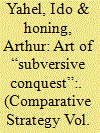

|
|
|
|
|
| Summary/Abstract |
How do states take over others' sovereign territories? This study explores in depth the techniques of a relatively unnoticed type of takeover—namely, through subversion but without formal annexation. Such takeovers are generally adopted when two conditions occur: seemingly high international costs associated with blunt/overt occupations and the victim state's territory not being ready for full-fledged annexation (for demographic reasons, etc.). To compensate for its lack of direct control over the territory in question, the dominating state must establish unique institutional and political arrangements that will allow it effective domination via remote control. Yet, these remote-control political arrangements are often fragile and get eroded over time, allowing the local populace to eventually rebel. Subversive method is nowadays becoming the preferred tool of choice for states to dominate others mainly due to the changing norms regarding military occupations/annexations.
|
|
|
|
|
|
|
|
|
|
|
|
|
|
|
|
| 2 |
ID:
156949
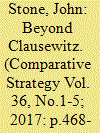

|
|
|
|
|
| Summary/Abstract |
Clausewitz has much to tell us about strategy. However, his most fundamental and enduring insights are obscured by his problematic theorizing about war in general. Essentially the same insights have been more clearly and economically articulated in the fields of political philosophy and game theory. As such, these literatures provide a more accessible introduction to the basics of strategy. The real value of Clausewitz resides in his profound understanding of how basic strategic dynamics play out in the specific context of war.
|
|
|
|
|
|
|
|
|
|
|
|
|
|
|
|
| 3 |
ID:
156937
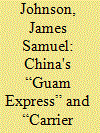

|
|
|
|
|
| Summary/Abstract |
A new generation of stealthier, supersonic, autonomous, and increasingly survivable Chinese anti-ship missiles (ASMs) with extended ranges, payloads, and accuracy are increasingly adept at evading U.S. defenses, and undermine the effectiveness of its surface fleets and carrier strike groups in the West Pacific. This article conceptualizes the evolution of Chinese ASMs through a structural-realist theoretical lens. It argues that the development and diffusion of these asymmetric precision-strike weapons have in important ways intensified U.S.-China security-dilemma dynamics, which could portend a paradigm shift (or at least the perception of one) in the future military balance of power in Asia.
|
|
|
|
|
|
|
|
|
|
|
|
|
|
|
|
| 4 |
ID:
156948
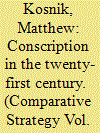

|
|
|
|
|
| Summary/Abstract |
In the years following the Cold War, European states scrambled to downsize and reorganize their militaries to reflect the new geopolitical environment. As a part of this transformation, virtually every NATO member suspended or phased out conscription. This article discusses the strategic rationale behind Germany's decision to end conscription while comparing it with Norway's decision to enhance the draft. In recent years, Norway has refined its defense strategy and shifted its focus away from territorial defense. Nevertheless, territorial defense remains a priority in Norwegian defense policy and conscription enables Norway to expand its territorial presence, maintain a total defense doctrine, and guarantee a stable level of military manpower.
|
|
|
|
|
|
|
|
|
|
|
|
|
|
|
|
| 5 |
ID:
156936
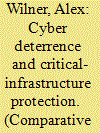

|
|
|
|
|
| Summary/Abstract |
Linking deterrence theory to cybersecurity policy and critical-infrastructure protection is easier said than done. Recent cybersecurity incidents involving the United States, China, Russia, and North Korea illustrate the yawning gap between cyber deterrence expectations, applications, and results. This article draws on classical deterrence theory to illustrate how the logic of deterrence applies to cybersecurity policy and strategy. By differentiating between physical and digital critical infrastructure protection, the article explores the promises and pitfalls of cyber deterrence in practice. Seven limitations are explored in detail, including: denying digital access, commanding cyber retaliation, observing deterrence failure, thwarting cyber misfits, addressing the cyber power of weakness, attributing cyber attacks, and solidifying red lines.
|
|
|
|
|
|
|
|
|
|
|
|
|
|
|
|
| 6 |
ID:
156945
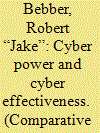

|
|
|
|
|
| Summary/Abstract |
This article proposes a theoretical framework to evaluate a state's potential cyber power and cyber effectiveness. It identifies the domestic and structural variables that contribute to potential cyber power, and the attributes associated with cyber effectiveness. Translating potential cyber power into cyber effectiveness is done through technical, tactical, operational, and strategic means. Effectiveness is worthwhile only in comparison to other target states. Finally, future research questions are proposed.
|
|
|
|
|
|
|
|
|
|
|
|
|
|
|
|
| 7 |
ID:
156940
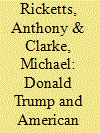

|
|
|
|
|
| Summary/Abstract |
This article examines the wellsprings of Donald Trump's nascent foreign policy program. It argues that the locus of the Republican president's foreign policy agenda is found within the Jacksonian tradition of American foreign policy identified by Walter Russell Mead. Here, notions of “national honor” and “reputation” are the driving factors that underpin Trump's emerging narrative. The implications of this for U.S. strategic and defense policy may be an enhanced reliance on nuclear deterrence and the downgrading of the U.S. military's forward posture in Asia and the Middle East.
|
|
|
|
|
|
|
|
|
|
|
|
|
|
|
|
| 8 |
ID:
156921


|
|
|
|
|
| Summary/Abstract |
Coercion can be employed both to entice people to do something they do not want to do, as well as to force them to stop doing something they want to do. Yet, some influence strategies work better than others. Current policy undermines coercive goals by depending on economic models for incentivizing behavior which are totally at odds with human psychology. Psychological models provide more accurate understandings of the nature of coercion, and offer more effective strategies for accomplishing such goals. Such an approach might improve both our understanding and practice of coercion in real-life decision-making situations.
|
|
|
|
|
|
|
|
|
|
|
|
|
|
|
|
| 9 |
ID:
156934


|
|
|
|
|
| Summary/Abstract |
The purpose of this article is to discuss some conceptions of strategy (and why it is difficult) and the need for a long-term perspective on strategy (including carefully studying competitors/opponents), and to emphasize the organizational nature of strategy (most strategies are developed by and implemented in organizations). We offer elements of an organizational framework for thinking strategically about national security, and some thoughts about implications for the education of future strategists.
|
|
|
|
|
|
|
|
|
|
|
|
|
|
|
|
| 10 |
ID:
156929


|
|
|
|
|
| Summary/Abstract |
This article analyzes how foreign policy is made in the Islamic Republic of Iran. To do so, it analyzes the role of various state institutions, factions, and individuals in the formulation and conduct of foreign policy. Actual powers of various institutions in Iran have evolved greatly since 1979. The history and causes of such institutional changes are discussed briefly. Iran is not a one-man dictatorship. Rather, it is ruled by an oligarchy comprised of fundamentalist Shia clerics and lay fundamentalists. The ruling elite is composed of competing factions such as hard-liners, expedients, and reformists, as well as sub-factions such as pragmatic hard-liners and ultra-hard-liners. The oligarchy is deeply divided on many issues, including on foreign policy. This article presents, in great detail, the views and policy proposals of the top members of the oligarchy regarding Iran's nuclear program, relations with the U.S., and Iran's regional policies. Finally, this article applies the findings of this research to the case of Iran's nuclear program. Evidence shows that Iran has had a clandestine nuclear weapons program. This article analyzes the ruling oligarchy's responses to the global reaction to Iran's nuclear program.
|
|
|
|
|
|
|
|
|
|
|
|
|
|
|
|
| 11 |
ID:
156922


|
|
|
|
|
| Summary/Abstract |
This article covers the history of nuclear weapons development in the United States by comparing the debates over each weapon generation, dividing the influencing factors into strategic and nonstrategic considerations. Though strategic factors seem to be more dominant, they are clearly influenced by nonstrategic factors and vice versa. The comparison also provides insight on how bureaucratic pluralism can be used to strengthen political pressure on the bureaucracy. The conclusions of this article may serve to gain better understanding of the ongoing debate regarding the moral and strategic effects of a new generation of nuclear weapons, should such weapons be proven feasible.
|
|
|
|
|
|
|
|
|
|
|
|
|
|
|
|
| 12 |
ID:
156927
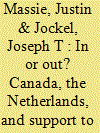

|
|
|
|
|
| Summary/Abstract |
How do democratic allies manage their participation in U.S.-led coalition operations? This article compares the Canadian and Dutch management of domestic and international expectations of support to the 2003 invasion of Iraq. It argues that the decision whether to support coalition operations often does not amount to a simplistic “yes” or “no” answer. It entails a management process involving several strategies, as well as a wide range of mutually inclusive support options. Canadian and Dutch management of support to coalition operations reveals that similarly core U.S. allies misunderstood U.S. expectations, mismanaged their country's stance by sending confusing signals to both their domestic and international audiences, and adopted varied trade-off strategies. The study of multinational coalition operations should thus conceptualize political and military support separately, but examine their causal interrelationships and measure them on a qualitative, case-specific continuum, in order to properly understand the variations and trade-offs involved in the allied management of support to military coalitions.
|
|
|
|
|
|
|
|
|
|
|
|
|
|
|
|
| 13 |
ID:
156947


|
|
|
|
|
| Summary/Abstract |
William W. Kaufmann assessed the efficacy of the United States' strategy of massive retaliation, introduced in January 1954 by then Secretary of State John F. Dulles, on three areas: capability, cost, and intention. Having established parity between New Delhi's current interpretation of massive retaliation and that of Dulles in 1954, this article applies Kaufmann's framework to gauge the credibility of India's strategy of massive retaliation. Taking cognizance of current developments in India–Pakistan relations and of India's evolving strategic priorities, this article argues that conditions neither exist nor could be created for massive retaliation to be a credible strategy of nuclear deterrence for India.
|
|
|
|
|
|
|
|
|
|
|
|
|
|
|
|
| 14 |
ID:
156924


|
|
|
|
|
| Summary/Abstract |
This article demonstrates that there are multiple strategies for state building, peace building, and security for civilian populations. In five cases of ongoing conflict, the liberal model of top-down state building and elections has caused considerable loss of lives and resources and could be considered to have failed. There are no long-term prospects for success in any of the five countries where the liberal model is being implemented with international assistance. The liberal model of power sharing followed by democratic elections has not provided greater protection from internal and external threats than would have one or more of the alternatives in four of the cases. In three of the cases, where there has been considerable bloodshed and displacement, freezing the conflict, separating the factions, and providing protection for civilian populations is an option that is less costly than the liberal model. Where conflicts are frozen, there can be international assistance for building the state in two or more sections. Where long-term prospects in building a unitary state are not good, freezing the conflict, protecting civilians, and sealing borders, as well as building the state from below, are less costly than the liberal model.
|
|
|
|
|
|
|
|
|
|
|
|
|
|
|
|
| 15 |
ID:
156926


|
|
|
|
|
| Summary/Abstract |
This article aims to analyze a very little-known classic of strategy, written by a Muslim scholar of the late fourteenth century called al-Ansari, which extensively discusses intelligence, strategy, deception, and stratagems. When comparing his work with those of some renowned authors such as Sun Tzu and Kautilya on intelligence issues, astonishing similarities and intriguing nuances emerge. In addition, al-Ansari develops a quite original argument on the relationship between spies and their dispatchers, with special reference to the psychological attentiveness between the two parties.
|
|
|
|
|
|
|
|
|
|
|
|
|
|
|
|
| 16 |
ID:
156943
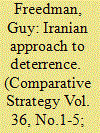

|
|
|
|
|
| Summary/Abstract |
Conventional wisdom holds that Iran has no formal doctrine of deterrence. Certain deterring agents have been identified, but these are incomplete and have not been organized as a whole to fully depict Iran's approach to deterrence. This article brings forward original Iranian literature in Farsi and presents Iran's definition and doctrine of deterrence: Altering the thought process of an enemy using inconspicuous threats, in order to remove external threats to Iran's security and independence. Understanding Iran's theory of deterrence is important both to policymakers and academics given the strategic interaction with Iran in recent years and in the future.
|
|
|
|
|
|
|
|
|
|
|
|
|
|
|
|
| 17 |
ID:
156944
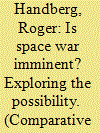

|
|
|
|
|
| Summary/Abstract |
A resurgence is occurring regarding the possibility of armed conflict in outer space. At a certain level, these new assertions regarding the possibilities of space war mirror similar arguments at the dawn of the space age. That enthusiasm for arming the heavens dissipated under the reality of conducting such operations proving extraordinarily difficult and expensive. Instead, the concept of a space sanctuary through international treaty and calculations of national interest became the norm. Recent actions and words by powers new to military space operations are generating a counterresponse by the United States. This study pursues the policy ramifications of changes in the understandings that characterize the current international space legal regime. Essential to understanding the new space order is the reality that the military space community now contains more members than the original two, the U.S. and the Soviet Union. The situation becomes a multisided game with profound implications in terms of budget, military organization and strategy, and politics. All this occurs in a situation of increasing international participation in space operations nominally commercial in nature. Commercial space applications hold the promise of allowing states to “skip” the developmental process by providing shortcuts not available previously.
|
|
|
|
|
|
|
|
|
|
|
|
|
|
|
|
| 18 |
ID:
156932


|
|
|
|
|
| Summary/Abstract |
Current literature holds that authoritarian regimes tend to misread the international environment, both because of information processing problems and the relative lack of incentives to learn. We argue that many dictators do learn over time how to better read the international environment. While there are certain qualities that autocracies cannot correct, they do often recognize other problems and take steps to address them (if it is not too politically risky). We identify the main steps dictators take to improve the quality of their debate in the inner circle and their understanding of the West, and shed light on the degree to which these steps actually help.
|
|
|
|
|
|
|
|
|
|
|
|
|
|
|
|
| 19 |
ID:
156931


|
|
|
|
|
| Summary/Abstract |
Every occupying power recruits collaborators but potential recruits vary with respect to their acceptance by occupied populations. That matters because the legitimacy of the occupation regime facilitates securing the war aims of the occupying power. This article surveys the different reasons why collaborators often elicit popular contempt, a response which may inspire insubordination and resistance, to produce a conceptual stencil of the optimal rather than the ideal collaborator. Limited pools of potential recruits mean that occupying powers may not be able to recruit ideal candidates. The resulting conceptual stencil can serve a checkoff list for evaluating the utility of potential collaborators.
|
|
|
|
|
|
|
|
|
|
|
|
|
|
|
|
| 20 |
ID:
156928


|
|
|
|
|
| Summary/Abstract |
Existing organizational cultures among agencies in the intelligence community serve as barriers to information sharing. These cultures are characterized by secrecy and limited disclosure of information. Their practices of limited information distribution and existing extensive compartmentalization of information serve as impediments to information exchange between agencies in the intelligence community. To remedy this, changes in the organizational cultures of agencies in the intelligence community are required. Without a change in organizational culture, the culture of information sharing envisioned by the reforms that have occurred in the intelligence community post-9/11 will not be realized.
|
|
|
|
|
|
|
|
|
|
|
|
|
|
|
|
|
|
|
|
|